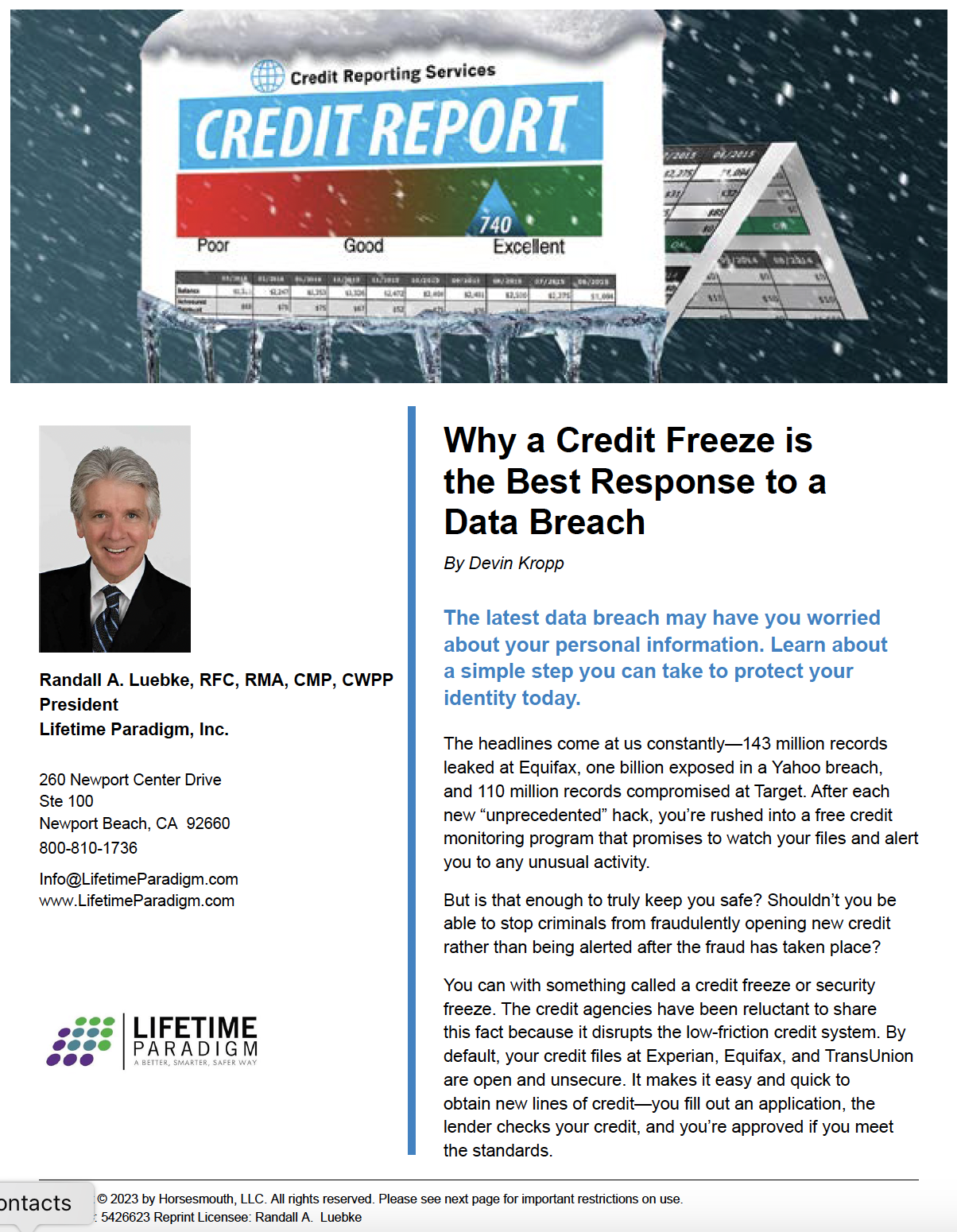Asset Protection
Why a Credit Freeze is the Best Response to a Data Breach
The latest data breach may have you worried about your personal information. Learn about a simple step you can take to protect your identity today.
The headlines come at us constantly—143 million records leaked at Equifax, one billion exposed in a Yahoo breach, and 110 million records compromised at Target. After each new “unprecedented” hack, you’re rushed into a free credit monitoring program that promises to watch your files and alert you to any unusual activity.
But is that enough to truly keep you safe? Shouldn’t you be able to stop criminals from fraudulently opening new credit rather than being alerted after the fraud has taken place?
You can with something called a credit freeze or security freeze. The credit agencies have been reluctant to share this fact because it disrupts the low-friction credit system. By default, your credit files at Experian, Equifax, and TransUnion are open and unsecure. It makes it easy and quick to obtain new lines of credit—you fill out an application, the lender checks your credit, and you’re approved if you meet the standards.
This easy system puts you at risk. Given the sheer number of recent data breaches, it’s very likely that your personal information—name, birthdate, Social Security number—has already been exposed. A hacker can use that data to steal your identity and obtain new credit without your knowledge
FREEZE YOUR CREDIT
One action can secure your credit file. A security freeze locks your credit file at each bureau with a special PIN that only you know. That PIN must be used in order for anyone to access your credit file or add new credit in your name.
It is imperative that you freeze your credit immediately at the big three credit bureaus—Experian, Equifax, and TransUnion.
A security freeze offers greater protection than the highly advertised credit monitoring and fraud alert. Credit monitoring does not stop a thief from opening a new account in your name. Instead, they alert you of a potential fraud after the fact—if their monitoring claims hold true. That is not good protection against identity theft. You’ll still have to put in the time to get your file corrected.
The same is true for LifeLock, a company that has been repeatedly fined by the government for unfair and deceptive trade practices. LifeLock alerts you after an identity theft has occurred instead of preventing it from happening.
The other option, fraud alert, offers more protection than credit monitoring but does not provide you with full security. A fraud alert can be placed on your account following any fraudulent activity and requires a business to verify your identity before issuing any new credit. A fraud alert, however, expires after 90 days and needs to be continuously renewed. That is not convenient, so avoid this approach.
A security freeze gives you complete control of your credit file and is the absolute best way to protect your credit and identity. Unlike credit monitoring or fraud alerts, a security freeze stops identity theft from happening rather than alerting you to fraud after it has occurred.
HOW TO DO IT
To set up a security freeze, you must contact each of the credit bureaus individually. This process can be done online or over the phone. You will be asked some questions to confirm your identity, but it only takes a few minutes.
You can freeze your credit by using the following phone numbers and websites:
- Equifax: 888-378-4329 / www.equifax.com/ personal/credit-report-services/credit-freeze
- Experian: 888-397-3742 / www.experian.com/freeze
- Transunion: 888-916-8800 / www.transunion.com/credit-freeze
Credit freezes are free for residents in all 50 states. To lift your freeze you simply contact the bureau used by the lender and provide your PIN to lift the freeze for a certain period of time. This can be done online or over the phone. It may take a few days for the freeze to be lifted, so be sure to initiate it a few days in advance of any deadline you are trying to meet.
STAY VIGILANT
Freezing your credit will provide peace of mind when you hear of the latest data breach. You should, however, continue to keep an eye on your credit.
Consumers are allowed one free credit report from each of the credit reporting agencies every year. Be sure to take advantage of this law and regularly check your credit reports for any discrepancies.
Devin Kropp is a New York-based writer for Horsesmouth.

SERVICES WE OFFER RELATED TO THIS TOPIC
The information contained in this post is for general use and educational purposes only. However, we do offer specific services to our clients to help them implement the strategies mentioned above. For specific information and to determine if these services may be a good fit for you, please select any of the services listed below.
The 4x4 Financial Independence Plan ℠
Retirement Planning
Asset Protection
Tax Planning
Coaching and Consulting
EP 0012. The Three Generations of Annuities
The Financial Independence Now Podcast Hosted by Randy LuebkeIn Episode 12 of the Financial Independence Now podcast,...
11 Financial Tips to Make Caregiving Easier
Tax Planning Caregivers generally tend to their elderly/ disabled family members as a labor of love, but it can also...
EP 0011. Budgeting for Dummies
The Financial Independence Now Podcast Hosted by Randy LuebkeIn this episode of Financial Independence Now, host Randy...
Investment Advisory Services are offered through Lifetime Financial, Inc., a Registered Investment Advisory. Insurance and other financial products and services are offered through Lifetime Paradigm, Inc. or Lifetime Paradigm Insurance Services. Neither Lifetime Financial, Inc. nor Lifetime Paradigm, Inc., or its associates and subsidiaries provide any specific tax or legal advice. Only guidance is provided in these areas. For specific recommendations please consult with a qualified, licensed Advisor. Past performance is no guarantee of future results. Your results can and will vary. Investments are subject to risk, including market and interest rate fluctuations. Investors can and do lose money and, unless otherwise noted, they are not guaranteed. Information provided is for educational purposes only and is not intended for the sale or purchase of any specific securities product, service or investment strategy. BE SURE TO FIRST CONSULT WITH A QUALIFIED FINANCIAL ADVISER, TAX PROFESSIONAL, OR ATTORNEY BEFORE IMPLEMENTING ANY STRATEGY OR RECOMMENDATION DISCUSSED HEREIN.
This message is intended for the use of the individual or entity to which it is addressed and may contain information that is privileged, confidential and exempt from disclosure under applicable law. If you are not the intended recipient, any dissemination, distribution or copying of this communication is strictly prohibited. If you think you have received this communication in error, please notify us immediately by reply e-mail or by telephone (800) 810-1736 and delete the original message.
This notice is required by IRS Circular 230, which regulates written communications about federal tax matters between tax advisors and their clients. To the extent the preceding correspondence and/or any attachment is a written tax advice communication, it is not a full "covered opinion." Accordingly, this advice is not intended and cannot be used for the purpose of avoiding penalties that may be imposed by the IRS.





